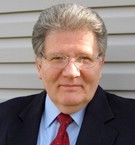Master of Divinity (Messianic Jewish Studies)
Overview
The Master of Divinity with a concentration in Messianic Jewish Studies is a special program in partnership with Chosen People Ministries at the Charles L. Feinberg Center for Messianic Jewish Studies in New York. This degree is geared toward men and women who have had experience in ministry and desire additional training and a specialized study of the Bible and theology with a focus on Jewish studies and Jewish ministry. Students in this program will be well prepared to serve in a variety of professional ministries that serve the Jewish community, in roles such as Messianic rabbi or congregational leader, pastor, teacher, missionary, outreach worker or educator. This program is designed to be completed in three and a half years with three summers of full-time study.
- Immerse Yourself in Jewish Culture — in Brooklyn. The concentration in Messianic Jewish Studies is unique as it is taught in the most highly populated Jewish area in the United States: New York City. In a city that is home to an estimated two million Jewish people, you will pursue your studies while living among and ministering to secular Jewish university students, ultra-Orthodox Chasidic communities in Brooklyn, or Israelis living on the Upper West Side. You will have limitless opportunities to experience Jewish life and culture as well as incredible opportunities for hands-on Jewish ministry experience.
- Dive Deep Into Specialized Courses in Jewish Studies. Biblical and theological training includes courses on Jewish history, rabbinic theology and literature, the Talmud and more — all of which are taught by Messianic Jewish professors with years of experience in Jewish ministry. With a specialized knowledge in Jewish culture and values, you will be well-prepared to minister in diverse communities in Messianic ministry.
- Master the Hebrew Language and Learn How to Interpret Old Testament Scriptures. The Master of Divinity requires you to know the biblical languages — both Greek and Hebrew — to provide a foundation for exegesis, but unlike any other program, this concentration’s emphasis on the Hebrew language results in a mastery of the language and competency in Hebrew exegesis. As you gain mastery of the language, you will enhance your ability to accurately understand and provide insight from rabbinic texts and interpret Old Testament law for today’s listeners.
- Get Practical With Rigorous Training in Ministry Skills. The Master of Divinity is a rigorous program because it not only requires knowledge of the biblical languages and theology, but also requires practical ministry skills — such as preaching, evangelism, discipleship, apologetics and leadership development. This program goes far beyond theory to the very heart of what it means to be a full-time worker among the Jewish people — whether your desire is to serve as a Messianic rabbi, pastor, teacher, or missionary to the Jewish people.
- Partner With Long-standing Ministries Committed to Reaching the Jewish Community. This program at the Feinberg Center is a joint venture between Talbot and Chosen People Ministries, a ministry that has been reaching out to Jewish people for more than a century. This partnership has resulted in a faculty with extensive Jewish ministry experience and a wealth of resources for those who are deeply invested in Jewish studies. Feinberg has a 10,000-volume library with a concentration in Jewish studies. Faculty and other academics have also established The Journal of Messianic Jewish Studies (JMJS).
For more reasons to choose Talbot School of Theology for your education, see the Why Talbot? page.



